Differentiation. It is how we address the diverse needs in our classroom. It is also the purpose behind the Math Workshop model.
Math Workshop is our district’s way of reaching students on their individual achievement level using data-based groups. Students are with peers who have similar misconceptions, areas of need and/or learning styles based on pre-assessments, formative assessments or other data. This arrangement promotes a safe and collaborative classroom culture built around mutual respect and student accountability.
There are six interchangeable stations for Math Workshop that each group of students can rotate through. The decision on which stations to use may depend on class time, content, grade level, class performance, etc. Teachers may choose to have all students in the same station, or assign groups to different station each day.
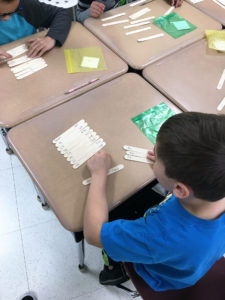
This student is engaged in a self-assessing activity on multiplication facts created by the teacher.
Submitted photo by Emily Chandler
Math to Self
The goal of this station is to have students working independently on differentiated content. Students should show their work with assigned tasks for the teacher to check or have a self-assessing task.
When choosing the content for this station, spiraled or reviewed content is best. Resources that work well are task cards, flash cards, Learning Palettes, Versa Tiles, Hot Dots, manipulatives, tools and quantiles.com.
Math to Self helps build self-motivated students who have the stamina to work for an extended period independently on their level.
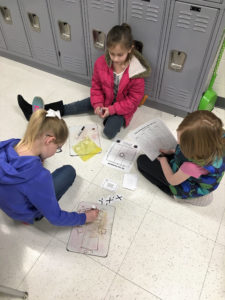
Students find area and perimeter in a group tic-tac-toe game.
Submitted photo by Emily Chandler
Math with Someone
This station’s goal is to nurture student-led discussions about math with one another.
Students work with a partner or in a small group, on spiraled and differentiated content. Ideas for partner or group work are math games, task cards, group projects or hands-on learning activities.
Math with Someone gives students the opportunity to collaborate in solving challenging problems, reasoning, arguing and critiquing the thinking of other students while being engaged in mathematical discourse, which strengthens their content understanding.
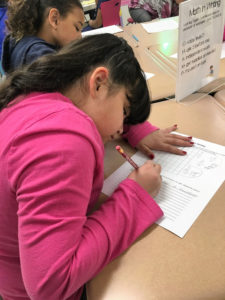
A student shows her math thinking as she critiques a given misconception.
Submitted photo by Emily Chandler
Math with Writing
The goal of Math in Writing is to have students analyze, reflect, explain and articulate math thinking through writing.
Resources and activities for this station could be extended-response questions, short answers, released test items, open-ended question prompts, math thinking organizers or graphic organizers.
Math with Writing encourages students to internalize their thinking, as well as formatively assessing students’ understanding of differentiated mathematical content.
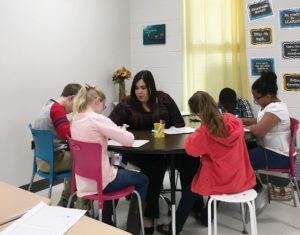
Emily Chandler questions a student on their thinking during a Math with Teacher exercise.
Submitted photo by Emily Chandler
Math with Teacher
Extending student knowledge on current content or spiraled content is the purpose of Math with Teacher. Resources that you might use with this station are your core curriculum resources, dry-erase boards for student practice and questions from previous assessments.
Math with Teacher is an opportunity for the teacher to differentiate instruction in a small group environment while addressing misconceptions and modeling math skills.
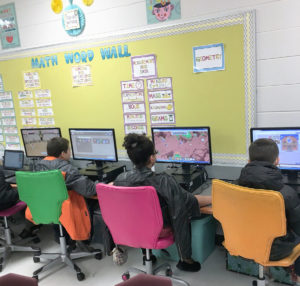
Students continue their progress on Prodigy and battle each other in solving math problems at this Math with Technology station.
Submitted photo by Emily Chandler
Math with Technology
This is by far the students’ favorite station! Computers, iPads and interactive whiteboards are great opportunities to capture a student’s attention, since our world is technology driven.
Students immerse themselves in online learning programs such as Prodigy, Zearn, MobyMax, or Studyisland. These programs differentiate by giving students a pre-assessment that helps place them at the appropriate level, while allowing teachers the opportunity to assign on grade level content.
Interactive manipulatives such as Illuminations, and online games such as Kakooma, also are great for students to explore at this station. Math with Technology helps create 21st century students, while strengthen mathematical knowledge.
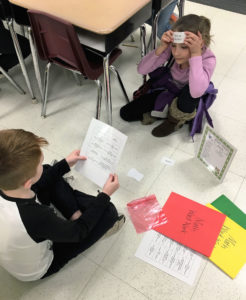
Students play heads up with a partner to define math vocabulary. A student holds up a vocabulary term on their forehead. Their partner is giving the definition and clues to help the student guess the term.
Submitted photo by Emily Chandler
Math Word Work
At this station, the students develop a deep understanding of mathematical vocabulary words. In order for students to accomplish this goal, they need the opportunity to discuss with peers the correct use of the terms.
Resources that are helpful to incorporate with this station are Thoughtful Education templates, Flocabulary, Quizlet, and word games such as heads up, matching games, bingo, crosswords, and memory.
In order for students to be able to have meaningful math conversations, they need to understand key math vocabulary terms. Math Word Work is the way to do that.
Implementing Math Workshop
Starting Math Workshop takes dedication, time, consistency and patience.
It is important to introduce one station a week so students can master the expectations before going on to another one. Each day the teacher introduces a new station, students create an expectation anchor chart that explains student and teacher actions. By allowing students to think and construct the expectations, they claim ownership over that station, along with an understanding that the rules are manageable.
When you notice that a student is not following the expectations, immediately stop, bring the class back to whole group and reteach the expectations. Continue doing this until all the students have built up the stamina to partake in the station while implementing expectations. This is tedious, but will save time throughout the year by not continually teaching expectations.
Math Workshop is a learner-friendly design, ideal for planning and instructing students working toward diverse learning goals. The planning process is intentional and enables teachers to clearly define learning targets and activities for each group, as well as to formatively assess and monitor student progress. Because Math Workshop is individually tailored instruction and incorporates a variety of learning styles, there is an increase in student engagement, student accountability and student growth.
So let us pretend you are a math student again. You have the option of choosing between two different classes. In classroom A, the teacher lectures for 60 minutes about math and students practice independently. In classroom B, the students are interacting with math and learning together in a safe and collaborative classroom environment.
Which classroom do you choose?
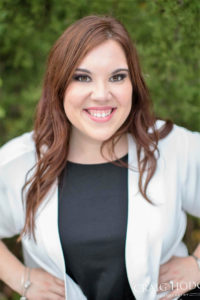
Emily Chandler
Emily Chandler is in her fifth year teaching 3rd-grade math at Pembroke Elementary School (Christian County). She has her undergraduate degree in Elementary Education through Murray State University. She is pursuing her master’s degree in Teacher Leadership through University of the Cumberlands.
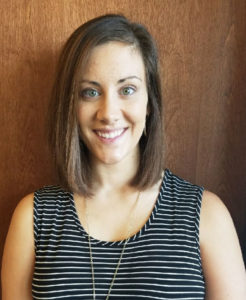
Jettie Payne
Jettie Payne has taught 5th-grade math for seven years and is in her first year as the district math coach. She has her elementary education bachelor’s and master’s degree in teacher leadership and a GT endorsement through Murray State University. She is currently working on her second master’s through Western Kentucky University in elementary education specialist, with an elementary math specialist endorsement.

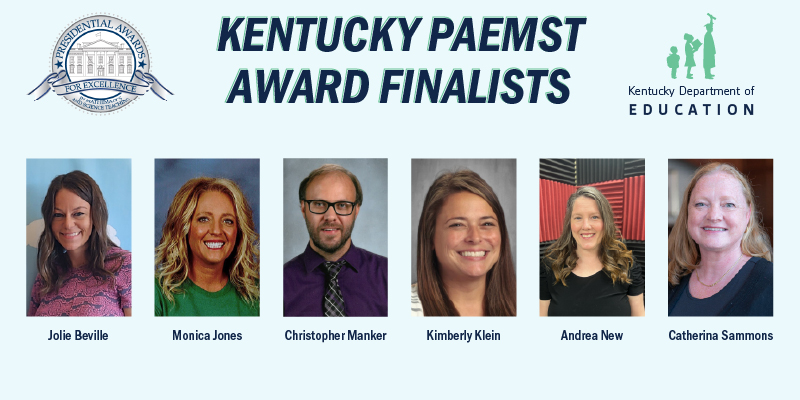
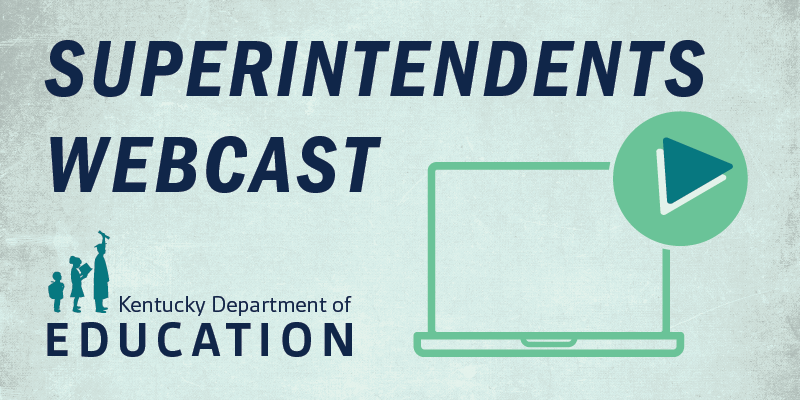

Leave A Comment